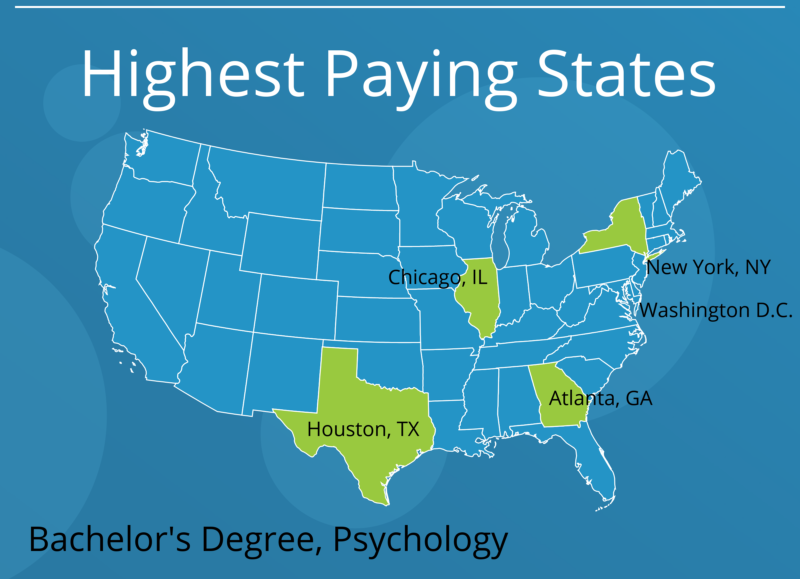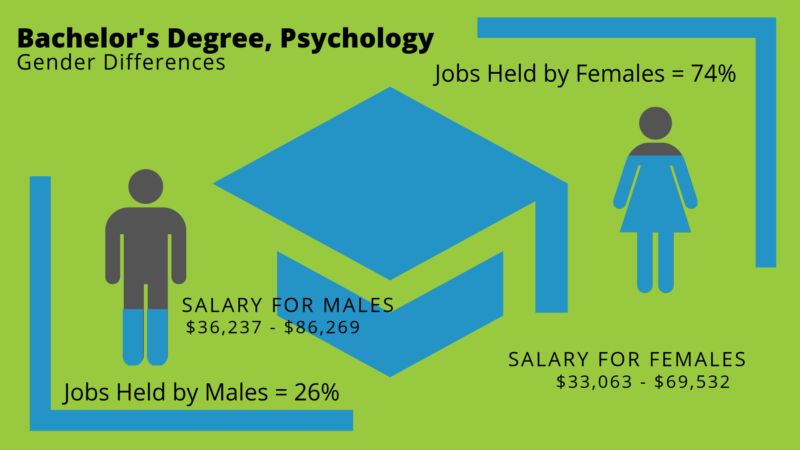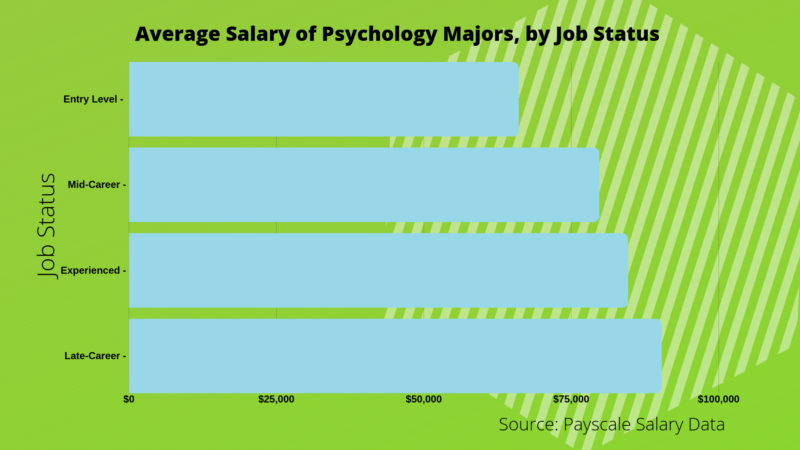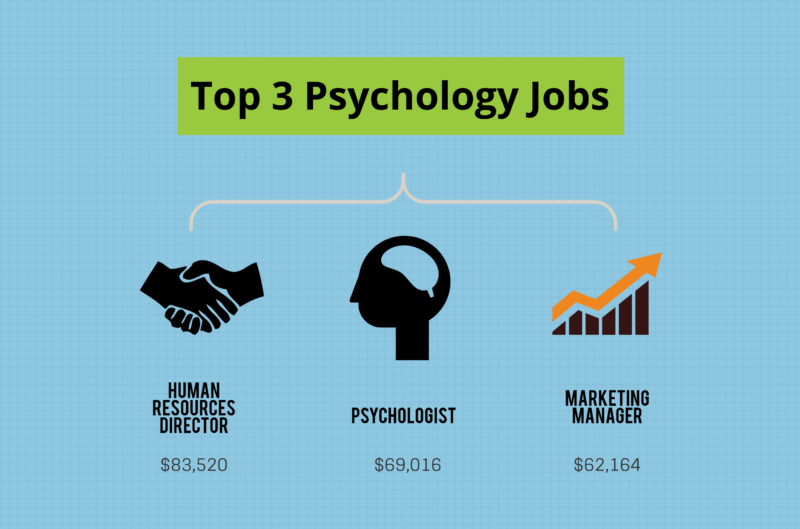Key Information:
- A degree in psychology opens paths in many fields including clinical roles, business, marketing, and education due to its deep understanding of human behavior.
- The bachelor’s degree provides a strong foundation in psychological theories and practices, which is essential for any further specialization or advanced studies in psychology.
- Post-graduation, there are numerous opportunities for specialization in areas like counseling, child psychology, or organizational psychology, often requiring further certification or studies.
People who are drawn to psychology as a field of study, to be completely frank, aren’t usually money or career-motivated. What first draws a student to a bachelor’s degree in psychology, for the most part, is a fascination with the human mind and its workings, and usually a desire to do some good in the world. The fascination really starts – and needs to start – before any concern with career trajectory. Psychology is a complex and demanding scientific healthcare field, filled with conflicting theories, open-ended questions, and plain mysteries. If, in the immortal words of Ulysses Everett McGill, “It’s a fool that looks for logic in the chambers of the human heart,” then psychologists are those fools, seeking out the patterns of motivation that account for human behavior.
What Can You Do with a Bachelor’s in Psychology?
That doesn’t mean that psychology isn’t a good career choice – it’s that psychology isn’t the kind of career where your path is easily laid out for you. There are many things to do with a bachelor’s in psychology. Building a successful career in psychology requires not just a command of the knowledge and skills of a psychologist, but making the most of opportunities laid out for you: in-demand specializations, certifications, continuing education, professional organizations, and building a network.
Related:
- Top Psychology Degree Programs
- Most Affordable Psychology Degree Programs
- Fastest Online Psychology Bachelor’s Degrees
The good news for psychology students is that psychology is so much bigger than most students realize when they begin their program. Graduates with a bachelor’s in psychology have a range of fields available to them, from the conventional clinical roles that probably first come to mind – the school psychologists, the substance abuse counselors, the mental health counselors, the marriage and family counselors – to areas that may be surprising. You may choose career in human services or social work as a social worker or case manager, career opportunities in childcare and education. Psychology graduates may work in the justice system as probation officers, or as a correctional treatment specialist or parole officer.
Psychology graduates are also in demand in business, in marketing, in sports, in real estate, in entertainment – pretty much any area where an understanding of human emotions, motivation, and behavior is useful.
With an advanced degree career options increase even more over an undergraduate degree. A graduate degree from a psychology graduate school can lead to law school, job opportunities in government agencies, and more.
So is psychology a good career choice for you? Read on, and make up your own mind.

Psychology Education, Licensure, and Certifications
Obviously, the first step to a career in psychology is an education in psychology. Psychology isn’t a profession you learn on the job, after all (you can’t get a job in psychology in the first place without at least a bachelor’s degree). The good news for aspiring psychologists is that psychology is one of the most common bachelor’s degree programs; virtually every college and university in the country is going to have a psychology program. If you can’t get into your first choice, there’s no reason to fret.
The bad news? It’s going to take a lot of effort on your part to find the right psychology bachelor’s degree for you, and it’s going to take even more effort to put that degree to use in a professional job. Even after finding an accredited psychology degree program and getting through your bachelor’s, there is the issue of specialized certifications and licensure to practice. But it all starts with an accredited program.
Psychology Accreditation
The first essential element in getting a psychology degree is making sure that it’s coming from an accredited degree program. There are plenty of disreputable diploma mills churning out completely worthless psychology degrees, because it’s a field with a fairly low barrier for entry; there are no laboratories or clinicals necessary. But if you want a real psychology degree – and licensure or certification to practice – it has to come from an accredited school.
The bare minimum is regional accreditation: recognition from one of the US Department of Education-recognized regional accreditation agencies. These seven agencies cover non-profit and for-profit community colleges, junior colleges, colleges, and universities in the various regions of the US: New England, the Mid-Atlantic, the South, the Midwest, the Northwest, and the West.
To put it simply, if your bachelor’s degree in psychology isn’t from a regionally-accredited college or university, you’re shutting yourself out of any real careers in psychology.
In addition, within many colleges and universities, psychology programs have their own accreditation. Psychology accreditation isn’t necessary for a school to issue a psychology degree, but accredited psychology programs are much more trustworthy. APA accreditation from the American Psychological Association tells students that the program has proven its quality, but it also tells employees that you had to work for your degree.
Other specialized programs may have accreditation from organizations including:
- Association of State and Provincial Psychology Boards (ASPPB)
- Council on Accreditation of Counseling & Related Educational Programs (CACREP)
- Council on Rehabilitation Education (CORE)
- Commission on Accreditation for Marriage and Family Therapy Education (COAMFTE)
- National Association of School Psychologists (NASP)
Again, these accreditations aren’t essential – you can still get a good degree in counseling from a school that isn’t CACREP accredited, for instance – but these specialized accreditations show that the schools are reputable in that particular area. More importantly, it often means the program has connections in the job market that can help you start your psychology career.
How Many Psychology Degrees are There?
Psychology is a very broad field, so there are as many types of psychology degrees are there are types of psychologists. Obviously, there are the different levels of psychology degree: Associate’s, Bachelor’s, Master’s, and Doctorate. But even if we only focus on a Bachelor of Psychology degree, there are a dizzying number of specializations in the psychology field that you will have to choose from:
- Clinical psychology – directly treating the mentally ill
- Cognitive psychology – studying how humans think
- Counseling psychology – providing guidance for clients
- Developmental psychology – studying how human minds grow throughout life
- Educational psychology – studying the intersection of thought and learning
- Industrial/organizational psychology – applying psychology to business and groups
- Neuropsychology – studying how the brain produces emotion and thought
That list only scratches the surface. Between research, clinical practice, and application, there are more specializations in psychology than even a long-time psychologist could probably name.
Professionals choose their specialization for a number of reasons. Sometimes it’s because they find it naturally fitting right away; sometimes it’s because they’re challenged by it, and overcoming the challenge makes them love it. Sometimes it’s because a specialization has a personal significance (someone who was adopted or lived in foster care may specialize in family counseling, for instance), or because there is a critical need in a community they care about (counselors specializing in transgender youth and adults, for instance).
You don’t necessarily have to choose right away; part of the fun of taking courses in your psychology bachelor’s program is trying out different specializations, different theories, and different methods to see what fits your personality and way of working. Many bachelor’s degree programs will only be generalist psychology degrees anyway. The in-depth specializations usually come with master’s programs.
But if you plan to go forward with a career in psychology, at some point you will have to specialize. With that in mind, it’s important to really give every course your all when you’re working on your bachelor’s in psychology.

Getting a Psychology Degree Online
The question of accreditation isn’t even a question with the best online psychology degree programs – it’s easy to find an online psychology degree accredited by the APA. Because psychology education is so heavily focused on theory and research, online programs in psychology have become quite common – it’s a field that translates easily to online learning.
A psychology degree online program is a good choice for the working adult who wants to finish their bachelor’s degree and move into one of the many careers in psychology. Even the cheapest online psychology degree can be accredited, and the best online psychology degree programs are as reputable as any on-campus program. With a wealth of APA accredited online programs, there’s always a psychology degree near me.
Psychology Certifications and Licensure
The American Board of Professional Psychology (ABPP) is America’s leading agency that oversees specialization certifications in psychology. The ABPP organized in 1947, with the guidance of the American Psychological Association, to create a centralized, uniform code for certification exams in various psychology specializations.
SO what certifications can I get with a bachelor’s in psychology? The process for earning an ABPP certification is rigorous. Each specialization has its own independent board, which sets the standards for practice in their individual areas. There are 16 specializations recognized by the ABPP for certification:
- Clinical Child and Adolescent Psychology
- Clinical Health Psychology
- Clinical Neuropsychology
- Clinical Neuropsychology Pediatric Subspecialty
- Clinical Psychology
- Cognitive and Behavioral Psychology
- Counseling Psychology
- Couple and Family Psychology
- Forensic Psychology
- Geropsychology
- Group Psychology
- Organizational and Business Consulting Psychology
- Police & Public Safety Psychology
- Psychoanalysis in Psychology
- Rehabilitation Psychology
- School Psychology
It’s worth noting that these are not all of the specialties and subspecialties in psychology – they’re just the ones that the ABPP offers certifications for. And the ABPP is not the the only agency or organization offering certifications – they’re just the biggest.
To earn an ABPP certification, psychologists must go through three steps:
- Credentials Review
- Peer-Reviewed Practice Samples
- Oral Examination
While the process is fairly straightforward, not many psychologists actually get a certification; no more than 5%, in fact, according to the APA. Many psychologists decide that the time and expense are not worth their while, but that is beginning to change as the field becomes more competitive. With only 5% of psychologists earning certification, going through the process helps new psychology professionals stand out.
ABPP certifications are national. Getting a license to actually practice as a psychology, counselor, or some other form of direct clinical practice, however, is a state-by-state process. For most states, to practice as a licensed psychologist requires a doctoral degree, so that’s out of the scope of Bachelor’s Degree Center.
Careers in Psychology
Psychology is one of those disciplines that people often study out of a desire to do good in the world, or out of fascination – not necessarily because they believe it will be lucrative. But the fact remains, if you did the work to get a bachelor’s in psychology, you’d probably like to get a job out of it. And you’d probably like for that job to make you a living wage, and maybe a little better; it is a highly skilled profession, after all.
What jobs require a psychology degree? Can you find high-paying jobs with a bachelor’s in psychology? And are the things you can do with a degree in psychology the kinds of things that pay a professional salary? What jobs can you get with a psychology degree bachelor?

So You Have a BA in Psychology – Now What?
I have a BA in psychology — now what? What jobs can you get with a bachelor’s in psychology? This is where a lot of programs, whether traditional or online, miss the mark. They’re so busy with all the theory and reading and writing and assessment that they don’t incorporate a lot of useful career or professional development advice. But there are many careers in psychology with a bachelor’s degree if you know where to look.
Bachelor’s in psychology entry-level jobs aren’t hard to find, but it may take some time to find something precisely in your wheelhouse. So what jobs require a psychology degree? Careers in psychology take a lot of forms, but the most common are areas related to public service and clinical care. If you’re wondering what to do with a bachelor’s in psychology, here’s the place to start.
Bachelor’s in Psychology Entry-Level Jobs
Career Counseling – If you’ve taken personality tests like the Myers-Briggs, you have a taste of what a career counselor does. Career counselor jobs have actually increased, as the job market has become more competitive and professionals look everywhere for an advantage. While we typically think of career counselor as working in a high school or college, demand has made it possible to find career counselor jobs in social services, industry, and private practice.
Counseling – Of course, counseling the first career path that comes to mind for psychology majors. Many psychologists will become licensed counselors in a variety of settings, including hospitals and private practice. Look for CACREP-accredited programs if you’re planning a career in counseling.
Educational Psychologist – The importance of educational psychology can’t be understated – the application of educational psychology in teaching and learning is an essential part of modern teaching. Educational psychology jobs are generally within schools, or at the district level. The Educational Psychologist helps schools and school systems design and implement policies to improve teaching and learning, applying educational psychology research to real situations.
Psychology Researcher – Psychology is a social science, and one of the most important aspects of the field is research. There are many opportunities for research in higher education settings and private research organizations. While colleges and universities may require a master’s degree for researchers, a bachelor’s in psychology could get you an entry-level job working for a nonprofit or private firm as a researcher.
School Counselor – While the jobs are often confused, graduates with an educational psychology degree may also find jobs as School Counselors. Rather than working with schools on a policy level, a school counselor applies their psychological knowledge to working directly with students in a variety of circumstances, including learning disabilities, emotional or psychological illness, grief counseling, and more.
Social Services and Criminal Justice: In the social services field, widely considered, there are many places for someone with a bachelor’s degree in psychology. With a degree specializing in children’s counseling or mental health, for instance, you may become a child protection agent; with a specialization in criminal psychology, you may become a behavioral analyst or forensic psychologist. Many psychologists specialize in rehabilitation counseling, helping rehabilitate people who are incarcerated or who have been released from prison.
Alternative Careers for Psychology Majors
Maybe you’re looking for things you can do with a degree in psychology that aren’t directly working with patients, or doing academic or scientific research. You’re definitely not alone – only around a quarter of professionals with a psychology degree actually work in clinical or academic settings. What jobs require a psychology degree that aren’t clinical? There are a surprising number of alternative careers for psychology majors.
Business is the place you want to look for high-paying jobs with a bachelor’s in psychology – in many cases, with much higher pay than clinical bachelor’s in psychology entry-level jobs. There are several business-related things you can do with a degree in psychology. An understanding of the human mind is very valuable in areas like:
- Marketing
- Consumer Research
- Organizational psychology
- Human Resources
All of these areas within business benefit from psychological expertise, and business-related careers in psychology are growing. In fact, the Bureau of Labor Statistics sees a 26% growth rate for industrial-organizational psychologists over the next decade.
Bachelors in Psychology Salary
If you’re expecting to walk out of your graduation to a raft of high-paying jobs with a bachelor’s in psychology, try not to be too disappointed. Bachelor’s in psychology entry-level jobs don’t pay any more than entry-level jobs in most professions. Now, it’s still far better than pretty much any job that doesn’t require a bachelor’s degree, but a bachelor’s in psychology salary is respectable – not a fortune.
So what is the average psychologist salary? That’s rather difficult to say; the BLS says that psychologists make an average of $77,000 annually, but that’s a misleading statistic. There is truly no such thing as an average psychologist, because there are so many specializations. With no end of specializations in psychology careers and salaries, it’s important to break down what to expect from a bachelor’s in psychology salary.
Psychologists who work in a social services context will have to expect to make less than a psychologist in a private practice, clinical, or industry setting. It’s a sad but true fact that our social services professionals work long hours, endure a lot of stress, and make a fairly low pay for their level of education and experience. What keeps them going is not payday, but making a difference in lives and communities.

Psychology Careers and Salaries
To be quite honest, there’s not always a fair match between psychology careers and salaries. According to the BLM, substance abuse counselors have an incredibly stressful, high-responsibility job, but because they usually work in a social services setting, salary is rather low: only $43,000 per year on average. With substance abuse at an epidemic level, though, the field is growing by 23%.
That’s considerably less than Marriage and Family Therapists, who make an average of $48,000 with much less stress. To sweeten the pot, most marriage and family counselors work in private practice, giving them considerable control over their workday and responsibilities. School and Career Counselors, on the other hand, make an average of $55,000, but again, that’s a somewhat misleading number. No one working in a public school, for instance, expects to make a fortune, but a successful career counselor job in a private consulting practice could make quite a bit more than $55,000 from clients looking for advice.
All of those alternative careers for psychology majors have a skewing effect on the stats as well, because they offer a rather high bachelor’s in psychology salary across the board. Industrial-Organizational Psychologists, for example, make an average of over $102,000 annually, according to the BLS, while Market Research Analysts make a solid $63,000 – and the field is growing by 23% as marketing takes over a bigger and bigger share of business. Training and Development Specialists, in turn, can count on somewhere in the neighborhood of $60,000.
Psychologist careers and salaries require a master’s degree to reach the higher reaches of status, and pay with it. It’s worth mentioning, though, that online master’s degree programs in psychology are extremely common, and make it quite convenient to earn the master’s degree while still working. What is the average psychologist salary with a master’s degree? That’s a topic for another time.
Professional Psychological Organizations You Should Join
To really make the most of your career in psychology, it’s essential that you join the psychological organizations related to your specialty or field. There are a lot of good reasons:
- Make connections with other professionals: Having a strong network of fellow psychologists can be a lifesaver if you find yourself in need of work, and convenient if you find you need a collaborator with expertise you don’t have.
- Prove expertise to clients and employers: Membership in professional psychological organizations shows that you are engaged and up-to-date with your profession.
- Fringe benefits: Joining psychological organizations usually includes a lot of fringe benefits, including subscriptions to professional journals; regional, national, and international conferences (for networking and socializing); and even unexpected benefits like discounts and insurance policies.
These organizations publish scholarly journals and newsletters, fund scholarships for psychology students, provide research grants, offer continuing education courses, and, of course, hold conferences for psychologists to meet and present new research. They are the active centers of the psychological field, where psychology grows and develops in practice.
There are many, many psychological organizations, associations, and societies nationwide and worldwide; virtually every specialization and subspecialization is represented by one or more organizations, from highly local and specific to international. Some of the largest include:
This is by no means an exhaustive list of professional psychological organizations; there are a host of interdisciplinary groups, regional organizations, and special interests, some with thousands of members, some with fewer than 100.
